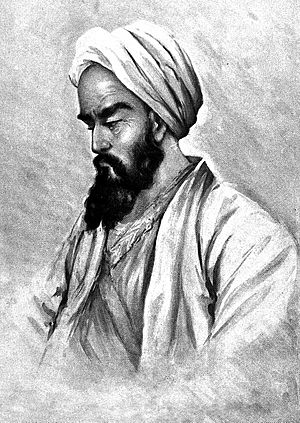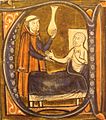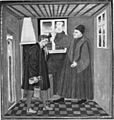Muhammad ibn Zakariya al-Razi facts for kids
Quick facts for kids
Razi
Abūbakr Mohammad-e Zakariyyā-ye Rāzī ابوبكر محمّد زکرياى رازى |
|
|---|---|
 |
|
| Born | 854 CE Ray, Abbasid Caliphate (Iran)
|
| Died | 932 (aged 77–78)
or 925 (aged 70–71) CERay, Samanid Empire (Iran)
|
| Era | Islamic Golden Age |
| Region | Islamic philosophy |
|
Main interests
|
Medicine, philosophy, alchemy, |
|
Notable ideas
|
The first to write up limited or extensive notes on diseases such as smallpox and chickenpox, a pioneer in ophthalmology, author of the first book on pediatrics, making leading contributions in inorganic and organic chemistry, also the author of several philosophical works. |
Abū Bakr Muhammad Zakariyyā Rāzī (Persian: ابوبكر محمّد زکرياى رازى Abūbakr Mohammad-e Zakariyā-ye Rāzī, also known by his Latinized name Rhazes or Rasis; 854–925 CE), was a Persian polymath, physician, alchemist, philosopher, and important figure in the history of medicine. He also wrote on logic, astronomy and grammar.
A comprehensive thinker, Razi made fundamental and enduring contributions to various fields, which he recorded in over 200 manuscripts, and is particularly remembered for numerous advances in medicine through his observations and discoveries. An early proponent of experimental medicine, he became a successful doctor, and served as chief physician of Baghdad and Ray hospitals. As a teacher of medicine, he attracted students of all backgrounds and interests and was said to be compassionate and devoted to the service of his patients, whether rich or poor.
According to the Encyclopædia Britannica (1911), he was among the first to use humoral theory to distinguish one contagious disease from another, and wrote a pioneering book about smallpox and measles providing clinical characterization of the diseases.
Through translation, his medical works and ideas became known among medieval European practitioners and profoundly influenced medical education in the Latin West. Some volumes of his work Al-Mansuri, namely "On Surgery" and "A General Book on Therapy", became part of the medical curriculum in Western universities. Edward Granville Browne considers him as "probably the greatest and most original of all the Muslim physicians, and one of the most prolific as an author". Additionally, he has been described as the father of pediatrics, and a pioneer of obstetrics and ophthalmology. For example, he was the first to recognize the reaction of the eye's pupil to light.
Images for kids
-
Depiction of al-Razi in a 13th-century manuscript of a work by Gerard of Cremona
-
al-Razi examining a patient (miniature painting by Hossein Behzad, 1894–1968)
-
al-Razi in his laboratory (orientalist painting by Ernest Board, c. 1912)
See also
 In Spanish: Al-Razi para niños
In Spanish: Al-Razi para niños








